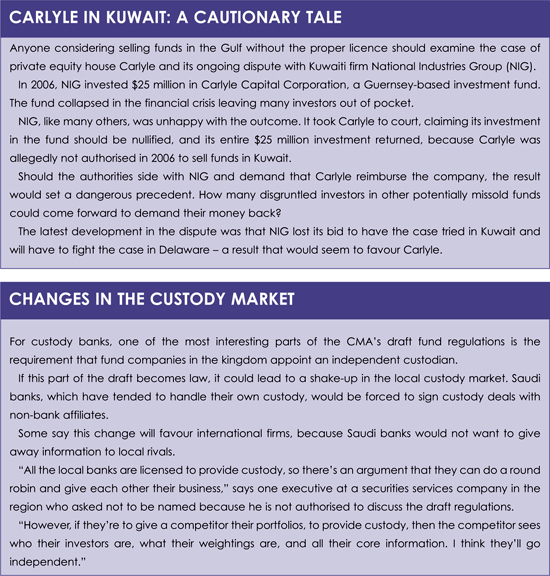 The Saudi regulator is cracking down on unlicensed funds. How can asset managers access the Gulfâs biggest funds market legally? George Mitton reports.
The Saudi regulator is cracking down on unlicensed funds. How can asset managers access the Gulfâs biggest funds market legally? George Mitton reports.
If you sell a fund in Saudi Arabia without a licence you could be fined or sent to prison. And unlike in the past, the Saudi regulator is serious about enforcing penalties.
The Capital Market Authority (CMA), which oversees the country’s financial markets, released a warning last year that people who conduct securities business in Saudi Arabia without a licence will be subject to sanctions, and any contracts signed by them will be considered void.
Are you worried? Have you ever bent the rules to sell funds without a licence in Saudi Arabia? If so, you might not be alone. Ben Aller, partner at law firm SJ Berwin in Dubai, says “historically, large international asset managers have been tempted simply to ignore the rules and market below the radar without notifying the CMA or hiring a local distributor”.
But it seems those lawless days are over. Underlining its new, tougher stance, the CMA has had a change of personnel. It has released a draft of new funds regulations that tighten up rules for Saudi and foreign funds.
As the biggest economy in the Gulf, Saudi Arabia is too attractive a market to overlook. How can asset managers access this market without breaking the law?
Saudi Arabia has had regulation for investment funds in place since 2006 but the draft of the new regulations, released in April, has attracted attention by removing several restrictions on Saudi-domiciled funds and allowing private placement of foreign funds for the first time.
The draft rules say a foreign fund can be marketed in a private placement to a limited number of individuals, with a minimum investment of 1 million Saudi riyals ($270,000) each.
If they become law, the new rules seem to offer a useful way for international asset managers to distribute funds to high-net-worth individuals in Saudi Arabia. However, the rules state that the fund must be distributed by a locally-licensed agent, which must share its records with the CMA and bear the liability for the fund in case something goes wrong.
That amounts to a considerable responsibility, says Aller.
“If there’s a Madoff and it all blows up, it’s easy to predict that the person on the front line is the Saudi distributor, who vouched for this fund,” he says.
Aller refers to the bogus wealth management business run by convicted fraudster Bernard Madoff. Had his fund been distributed in Saudi, it appears the fund’s Saudi distributor could have been liable for damages. But what liabilities?
“If there were allegations of fraud, if someone had lied or acted in bad faith, the sanctions would be both civil and potentially criminal,” says Aller. “The CMA generally applies penalties, but you can imagine in a particularly egregious case it would be worse than that. Even in the absence of fraud, a Saudi-authorised person could face civil penalties if they’ve acted negligently, if they didn’t do proper due diligence on the fund.”
 With so much at stake, it is perhaps not surprising that Aller says a number of authorised entities in Saudi Arabia who could distribute foreign funds are choosing not to do so because they don’t want the risk of distributing someone else’s fund.
With so much at stake, it is perhaps not surprising that Aller says a number of authorised entities in Saudi Arabia who could distribute foreign funds are choosing not to do so because they don’t want the risk of distributing someone else’s fund.
This is problematic for foreign asset managers who wish to market their funds by private placement in the country. Aller says it can be difficult to find a Saudi partner who understands the rules and is willing to do business at a price that isn’t unreasonably high.
A NEW MODEL
Yet it is possible to find Saudi partners willing to distribute foreign funds. A potentially significant, newly signed partnership deal is that between BlackRock and Saudi Fransi Capital, the asset management division of Saudi Fransi bank.
Saudi Fransi Capital will offer 30 funds out of the 80 funds on BlackRock’s Luxembourg Sicav range to investors in Saudi Arabia on a private placement basis.
“Saudi Fransi will be a distributor of our Luxembourg fund range, giving us penetration of the Saudi market while allowing both firms to continue to work with other market players,” says Nicholas Anderson, head of Middle East and Africa, BlackRock.
Saudi Fransi Capital must have complete confidence in the BlackRock funds, because it is ultimately vouching for them with the CMA. BlackRock must have confidence in Saudi Fransi Capital’s compliance standards, because Saudi Arabia is a higher risk jurisdiction with regards to European guidelines on anti-money laundering and “know your client” standards.
Investment companies could previously have bought BlackRock funds on a discretionary basis, by reverse solicitation, but this is the first time the Luxembourg range can be accessed through a Saudi-domiciled bank, says Doug Bourne, vice president in BlackRock’s team in the Middle East.
Some questions remain over the draft rules, however. Bourne says BlackRock has been unable to determine if an apparent limit of 200 investors in a private placement applies to the fund or to the placement. Could the same fund be registered with multiple banks, to achieve up to 200 clients per registration? The rules are apparently unclear.
Nevertheless, the deal could pave the way for more private placement relationships. The deal is less binding than the route most international asset managers have taken to
access Saudi Arabia so far – managing segregated mandates for Saudi banks.
This is the model employed by, for instance, Fidelity Investment Management in its long-running partnership with Riyad Bank. In this model, an international asset manager agrees to manage assets on a sub-advisory basis for a Saudi partner. The Saudi partner handles licensing, marketing and distribution, and may also “white label” the product with its own branding, but the assets are managed by the international firm.
Some firms have had success raising Saudi assets this way. However, the model can be a comparatively costly way to enter the market. Many believe private placement-like deals will displace the sub-advisory model in the coming years.
“Traditional models have all been about international firms managing funds for a Saudi bank,” says William Wells, head of intermediary sales, Middle East at Schroders. “What is likely to come through more and more is private placement by locally-licensed institutions of foreign funds. That’s the way distribution is likely to increase over time.”
Choosing a platform
Yet another way to distribute funds in Saudi Arabia is on a funds platform. Derayah is a fund supermarket based in Riyadh that gives retail investors a convenient access point for a range of Saudi-licensed funds.
Mohammed El-Kuwaiz, chief executive, says he was inspired to found Derayah after the 2006 crash in regional stock markets, in which countless Saudi retail investors made losses. He decided investors had lost money not because their investment products were intrinsically bad, but because they had been given bad investment advice.
“We were in a market where the providers were the managers as well as the advisers and distributors, so they had an embedded incentive to push their own products whether they were the most suitable or not,” he says.
El-Kuwaiz decided to found a company, based on a model common in Europe and the US, that would be an independent and impartial distributor. The platform currently lists nearly 100 products from nine providers, including the likes of HSBC and NCB Capital.
The products listed so far are from Saudi-licensed companies that are registered with the CMA. However, El-Kuwaiz says he has been working for two months on adding funds
from international asset managers to the platform. Doing so will require Derayah to act as the locally licensed distributor, bearing the liability for the products.
“As we introduce more international products, more of the onus will be on us to make sure we’ve done our due diligence to make sure these products are appropriate,” he says.
Derayah is willing to take on the effort to put foreign funds on its platform – and vouch for them with the CMA – provided the funds offer something not already available on the platform, and provided Derayah is confident the funds will attract the inflows needed to offset licensing and regulatory costs.
But this is not the only service Derayah can offer foreign fund providers. The firm also deals with foreign asset managers that already distribute in Saudi Arabia and which need advice on how to comply with the new rules.
“We offer a regulatory licensing service, where the firm would like to carry out its own distribution, and has its own existing relationships, but simply needs our support for getting the fund licensed,” says El-Kuwaiz.
“We may be asked to become the sponsor of the fund to license it and ensure it complies with local regulations. The process is ongoing for several firms in the private equity domain.”
In other words, Derayah handles the licensing for funds for a fee, but does not list them on its platform. El-Kuwaiz says that although other companies in Saudi Arabia have done similar deals on a one-off basis, he believes Derayah is the only firm offering this service as a distinct product line.
THE EXCEPTION
The draft rules for Saudi investment funds largely concern products aimed at retail and high-net-worth investors. There is a tacit understanding that large institutional investors have the expertise to evaluate their investment decisions themselves and do not need protection. Although the CMA has not said so explicitly, international asset managers are understood to be allowed to visit the Saudi Arabian Monetary Agency, the country’s sovereign wealth fund, without having a CMA licence.
For those international firms whose interest lies only in securing mandates from the sovereign wealth fund, the new investment rules are not of pressing importance. But for any company with an interest in accessing the Saudi retail market, which is by far the largest in the Gulf, the draft rules provide a tantalising opportunity to establish a new distribution model. The key will be finding a local partner.
©2013 funds global mena
